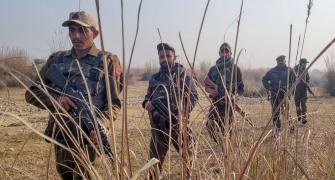The impasse in the Lok Sabha over Iraq was finally resolved on Tuesday after leaders of all political parties agreed to adopt a unanimous resolution only in Hindi, leaving it open to interpretation in English.
The stalemate arose because the government was reluctant to condemn the Anglo-American attack on Iraq in the strongest possible terms, which was what the opposition wanted.
The issue had brought the Lower House to a virtual standstill since Monday, when it resumed work after a three-week recess.
It took a series of meetings in Speaker Manohar Joshi's chamber and a few adjournments for the MPs to find common ground.
Joshi read out the full text of the draft resolution when the House reassembled at 1400 IST on Tuesday after two adjournments earlier in the day.
The resolution agreed to by both sides (in Hindi) reads: Rashtriya bhavnaon ko vyakt karte huye yeh sadan prabhuttasampan Iraq ke viruddh America ke netritv mein gatbandhan ki senaon dwara ki ja rahi sainik karvahi ki ninda karta hai.
[Translated it could mean: Expressing the feelings of the nation, the Lok Sabha strongly disapproves of the military action by the US-led coalition on a sovereign nation, Iraq.]
To break the deadlock, the opposition climbed down from its rigid stand of nothing less than condemnation of the attack while the government got a breather by getting the former to drop the word ghor (strongly -- in the context of ghor ninda) and agreeing to only a Hindi version of the resolution.
A senior minister told rediff.com that the word ninda means 'to deplore' and ghor ninda means 'condemnation'.
But opposition leaders insisted that ninda means 'condemnation' while the word 'deplore' translated into Hindi would be dukh prakat karna ya afsos zahir karna.
The resolution also said that US-led troops should withdraw from Iraq and humanitarian assistance should be immediately provided to the people through the United Nations.
It also wanted India to provide immediate assistance to the people of Iraq in the form of 50,000 tonnes of wheat.
Later, External Affairs Minister Yashwant Sinha defended the resolution saying the language was consistent with the dignity of the House.
Seeking to allay fears that many countries, including India, would be subjected to Iraq-like treatment, he asserted that India is a strong democracy of over one billion people and it could not be subdued by any power.
"New Delhi's foreign policy has been based on peace, reason and morality," he said. These will be pursued based on national interest, he added.
"Though we differ with the United States on this issue, our friendly relations will continue," he said.







